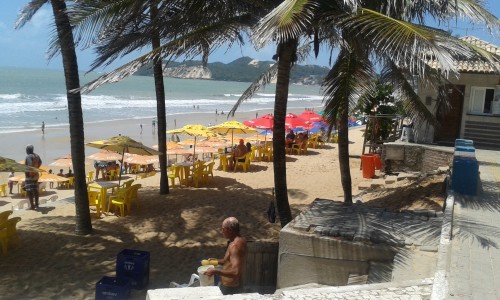
Paradise for physicists – the scene just metres from the venue for the 50th anniversary meeting of the Brazilian Physics Society in Natal.
By Matin Durrani in Natal, Brazil
From London via Lisbon, I arrived yesterday evening in Natal – a city of 800,000 people on the north-eastern tip of Brazil – for the 50th anniversary meeting of the Brazilian Physics Society (SBF).
I was invited by Ricardo Galvão, previous SBF president and chair of the organizing committee, to take part in a session later in the five-day meeting about the development of physics over the next two decades.
As editor of Physics World, which is published by the Institute of Physics (IOP), I’ll be joined by representatives from other physical societies around the world.
As you can see above, Natal – capital of the Rio Grande do Norte state – is blessed with some wonderful sandy white beaches and is a favourite spot for holiday-makers.
There are more than 2000 delegates at the meeting, most of whom – as far as I can tell – are not on the beach, but indoors in the hotel conference rooms, where there are more than 230 symposia to pick from.
What the SBF has done is to bring together all its many annual and biannual meetings across the whole of physics into one mega-event. So the “Encontro de Física 2016” boasts everything from atomic, biological and condensed-matter physics to nuclear, particle and optical physics, plus seven special plenary lectures by invited guests.
IOP Publishing, which is one of the co-sponsors of the event and has a booth at the exhibition too, has developed close connections with the SBF in recent years. In 2013, for example, we published a special magazine for the society to showcase the impact and importance of Brazilian physics research.
There’s also an interesting connection between Bristol – the city where IOP Publishing is based – and Brazilian physics. As I mentioned in a Physics World blog on my last visit to Brazil in 2013, it was in the University of Bristol’s physics department that César Lattes – one of the pioneers of post-war Brazilian physics – discovered the pi-meson with Cecil Powell in the late-1940s using giant balloons.
Some argue Lattes deserved to take a share of the 1950 Nobel Prize for Physics that only Powell was awarded, even though both wrote the seminal Nature paper in which the discovery was published.
As things stand, no Brazilian physicist has ever won a Nobel prize but – who knows? – perhaps a future Nobel laureate is lurking at this meeting.
Guidelines
Show/hide formatting guidelines
this text was deletedwhere people live in harmony with nature and animals</q>
Some text